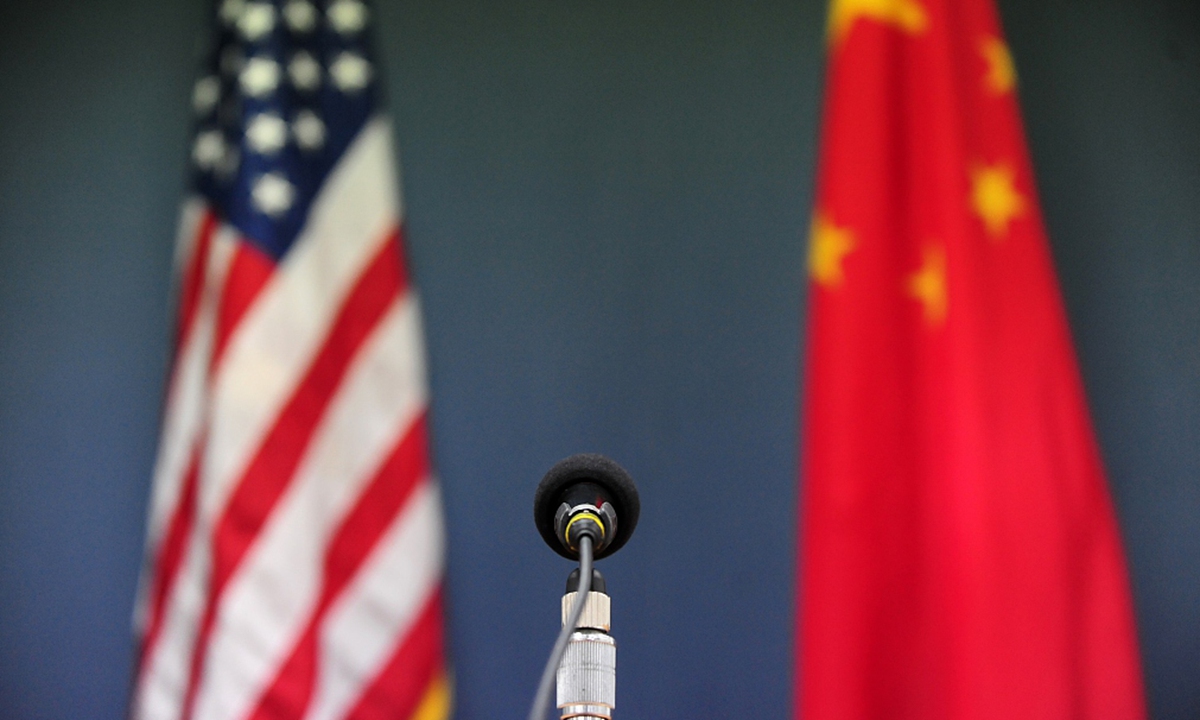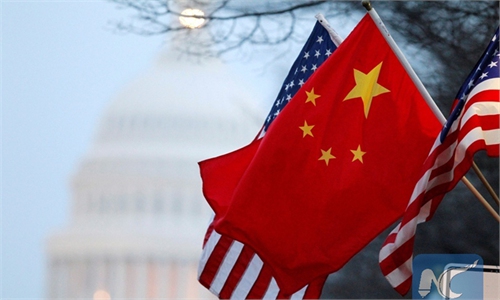Xi, Biden phone call on Chinese New Year’s Eve ‘tone-setter’ for future bilateral ties

China US Photo:VCG
The phone call between Chinese President Xi Jinping and US President Joe Biden on Chinese New Year's Eve serves as a tone-setter for future bilateral relations in short term and shows that the two sides are willing to push bilateral ties forward in a more positive direction that can manage ties through constructive dialogue and cooperation. Chinese observers said the phone call, arranged on Chinese New Year's Eve, shows the Biden administration's goodwill toward the Chinese government and the Chinese people.
Biden conveyed festive greetings to the Chinese people and wished the Chinese people a happy and prosperous New Year. Xi congratulated Biden once again on taking office as US president, and wished the people of China and the United States a happy and auspicious Year of the Ox, according to Xinhua News Agency.
The China-US relationship is one of the most important bilateral relationships in the world for the 21st century. The four-year term of former President Trump brought China-US ties to their lowest point since diplomatic ties were established. There is also strong resistance from US conservatives forces that call for confrontation between the two countries, setting huge obstacles in the way for the two sides to repair their relationship.
In the phone conversation, citing Biden's saying that the biggest trait of the US is possibility, Xi said he hopes such possibility will lead the bilateral ties to a positive direction.
It's reported that in his first day of office, Biden brought up an anecdote about President Xi when they were both vice presidents. In a private dinner on the Tibetan plateau years ago, Biden defined America in one word: possibilities -- in a conversation with Xi. "We believe anything's possible if we set our mind to it, unlike any other country in the world," Biden was quoted as saying then.
Xi's reference to this anecdote indicates the familiarity between the two leaders. It also carries great political significance, as currently there's great uncertainty in US politics and society, China also hopes Biden can give play to his imagination and bring bilateral relations back to the right track of normalization, Lü Xiang, a research fellow at the Chinese Academy of Social Sciences in Beijing, told the Global Times.
"The two leaders had relatively close contact in the past, and they know each other well. Their phone conversation was not political formula," Xin Qiang, deputy director of the Center for US Studies at Fudan University, told the Global Times.
During the call, Xi said that cooperation is beneficial for both China and the US; while confrontation will hurt both. Cooperation is the only right choice.
Xi also said that China and the US have different views on certain issues, but the keys are mutual respect and equal treatment of each other. Issues regarding Taiwan, Hong Kong and Xinjiang are China's domestic affairs that concern China's sovereignty and territorial integrity. The US should respect China's core interests and deal with those issues prudently, said Xi.
Biden also said that China and the US should avoid confrontation and increase cooperation in fields such as climate change. Upholding the spirit of mutual respect, the US is willing to have candid and constructive dialogue with China, to enhance understanding and avoid misunderstandings and misjudgments.
Both leaders believe the phone call will be a positive signal for the world.
"Judging by the content of their phone conversation, Biden is seeking more cooperation with China, while staying in line with US interests, "said Zhang Tengjun, an assistant research fellow at the China Institute of International Studies.
Zhang said the call will at least serve as a tone-setter for future China-US relations in the short-term, and lay the foundation for upcoming contact between the two countries.
Li Haidong, a professor at the Institute of International Relations of the China Foreign Affairs University, told the Global Times that usually Chinese leaders will hold phone calls with their US counterparts shortly after the latter are elected. Yet the first phone call between Xi and Biden occurred nearly one month after Biden took office, said Li, noting the reason lies mainly with the US side.
"Anti-China atmosphere was created under former US President Donald Trump's rein. So Biden is facing domestic pressure to avoid getting too close to China. But choosing to hold the phone call with the Chinese leader on Chinese New Year's Eve demonstrates Biden's willingness to improve ties, and to bring divergences under control," said Li, noting it is a good sign that bilateral relations won't deteriorate and spin out of control.
Xin said that Biden's mentioning of issues such as Hong Kong, Taiwan and Xinjiang is merely following US leaders' old track of pressuring China, but unlike his predecessor, Biden is willing to bring those divergences under control through dialogue, instead of unilaterally slapping sanctions on China. This shows Biden's goodwill when it comes to preventing the further deterioration of bilateral ties, said Xin.
As perhaps one of the signals of goodwill, on Tuesday, Biden withdrew US policy that required US schools and universities to disclose their partnerships with Confucius Institutes.
Yet the US President announced Wednesday a new Defense Department task force aimed at assessing the US military's China strategy. "That's how we'll meet the China challenge and ensure the American people win the competition in the future," Biden said during his first visit as commander in chief to the Pentagon.
Zhang said this background also highlighted that the US is adopting a strategy mixing soft and harsh approaches toward China. Cooperation will expand, but the tough stance toward China will still prevail, said Zhang.



